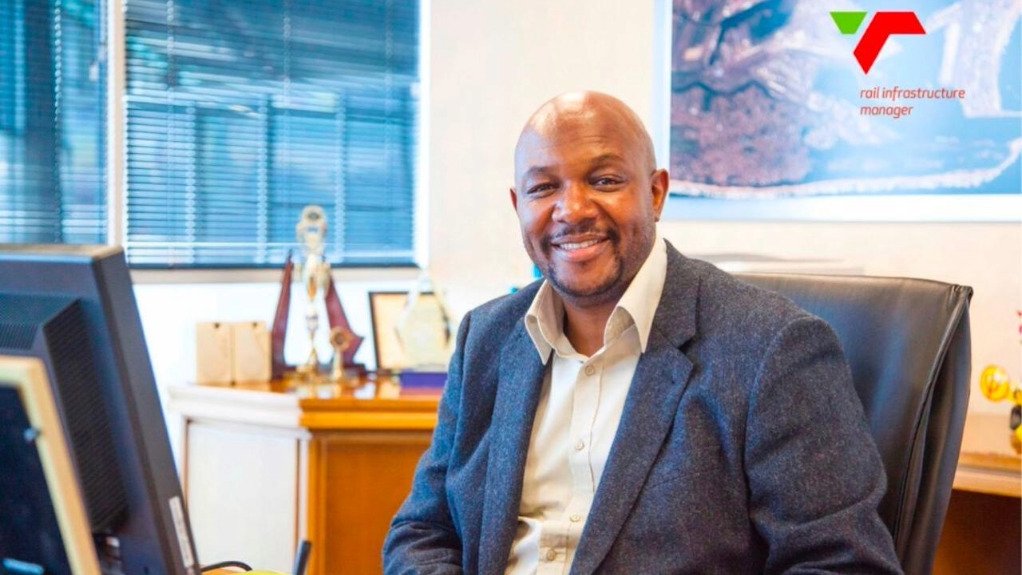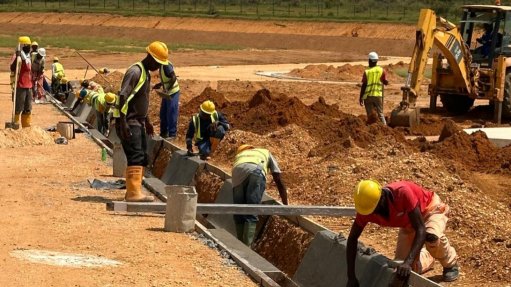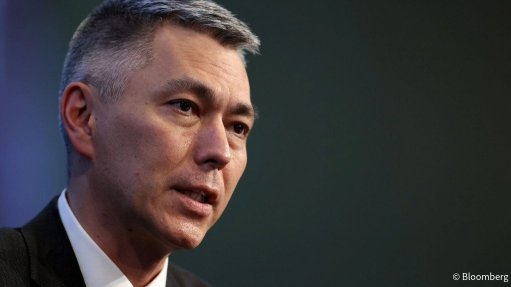Transnet Rail Infrastructure Manager gears up to allocate first rail slots to private operators
South Africa’s recently established Transnet Rail Infrastructure Manager (TRIM) is gearing up for the allocation of the first route slots to private train operating companies (TOCs) in line with the long-awaited Network Statement, published in December.
The Network Statement, which includes a tariff structure that is considered to be decidedly more attractive to potential TOCs than the allowable-revenue pricing model outlined in the preliminary draft, provides the initial framework and pricing for the integration of third-party operators. The Network Statement will be updated yearly on April 1.
A differentiated access tariff regime has been approved, with tariffs varying by commodity or corridors. It is a two-part tariff where one tariff is based on train kilometres and the other on gross ton kilometres.
TRIM interim CE Moshe Motlohi tells Engineering News that applications for the first slots will close on February 7, followed by a 60-day adjudication period, after which preferred bidders will be announced.
These initial routes cater for a modest 2.4-million tons across five corridors, including:
- a weekly 104-wagon train carrying manganese on the Cape Corridor from Hotazel to Gqeberha;
- a weekly 348-wagon iron-ore train on the Ore Corridor from Sishen to Saldanha;
- two weekly 50-wagon container-train slots on the Central Corridor, from Capital Park to Kingsrest and from City Deep/Kaserne to Kingsrest;
- two weekly 80-wagon train slots for magnetite on the North-East Corridor, including one from Phalaborwa to Richards Bay and another from Phalaborwa to Maputo; and
- a weekly 50-wagon train carrying chrome on the North Corridor from Pendoring to Richards Bay.
The capacity allocation across the routes is based on an assessment of the state of the network, which has major maintenance and investment backlogs. The network’s current yearly capacity has, thus, been calculated to be only 180-milion tons, well below the 209-million tons initially forecast and far from the 250-million-ton target set for 2030.
Motlohi expresses confidence that credible bids will be forthcoming, highlighting that bidders must pay a non-refundable R125 000 to participate in the inaugural bidding process for route allocations that will endure for ten years and include a renewal option.
He refuses to be drawn on a timeframe for the operation of the first TOCs, however, noting the novelty of the process that will involve a steep learning curve.
Having grown up in the Eastern Cape town of Barkly East, where there was once a thriving and scenic branch line, Motlohi has worked most of his 22 years at Transnet within the port system, both at Transnet Port Terminals and Transnet National Ports Authority (TNPA).
He believes his arm’s-length relationship with the rail business will enable him to approach the opening of the rail network with “fresh eyes” and with less anxiety over the introduction of third-party operators.
In addition, he plans to draw on the concessioning experience he gained while at TNPA, where he worked on various initiatives to integrate private terminal operators at the Port of Durban and the Port of Richards Bay.
“I am committed to the opening of the network to private operators and to working with the various stakeholders in a collaborative manner, including the National Logistics Crisis Committee.
“My approach is informed by an acceptance that Transnet is unable to recover rail volumes alone and that the national economic interest and the interest of freight customers’ needs to take priority over Transnet’s commercial interests to achieve that goal.”
MAINTENANCE BACKLOG
That said, he is under no illusion about the size and complexity of the task ahead in a context where the network is in a poor condition and where both Transnet’s own finances and the tariff model outlined in the Network Statement will be insufficient to cover the repairs needed, let alone any growth capital.
To achieve the 250-million-ton yearly volume target, R65-billion will be needed for maintenance and capital expenditure over the coming five years, for which Transnet itself has the resources to fund about half.
“We are going to need funding support from government along the lines of the yearly fiscal transfers made to the South African National Roads Agency Limited if we are to have any chance of returning the network to a state where we can recover the rail-friendly cargo currently being transported by road,” he tells Engineering News, noting that infrastructure managers internationally tend to receive fiscal support.
For the immediate future, however, TRIM will be seeking to leverage resources from key customers on its corridors through a model that enables those customers to recover the costs of those investments over time. He reports that there is already support for such an approach on the coal corridor and that he intends canvassing key customers on other corridors to do likewise.
In addition, the new entity will be seeking to access funding through the Budget Facility for Infrastructure, or BFI, a National Treasury initiative that supports the execution of national priority infrastructure projects.
In the medium term, there is also potential for private sector participation in rail infrastructure, but the Department of Transport is still working to finalise that framework.
BUILDING A BUSINESS
Besides opening the network to TOCs in 2025, Motlohi says he will also be prioritising the consolidation of TRIM itself, into which 56% or 14 000 of Transnet Freight Rail’s employees have been transferred. The remainder have been transferred to the Transnet Freight Rail Operating Company, or TFROC.
The business is still operating with an interim executive committee, which Motlohi wants to be made permanent by April. It also requires major interventions in the areas of maintenance, signalling, security, information technology and community engagement to place it on a firmer operational and financial footing.
“My message is that we are here to improve a network that is the backbone of the economy, and we are genuinely open to third parties coming in to help us to improve the situation,” Motlohi says.
On whether this can be achieved while TRIM and TFROC remain part of the same State-owned company, he argues that objective rules and processes have been well mapped out and that the professional reputations of TRIM executives depend on them treating TOCs and TFROC fairly and with integrity.
“As for me, everyone who works here must know that it is about the country first,” he says, adding that he remains haunted by revelations that Transnet’s poor performance led the mining industry to forego R200-billion in export earnings in 2023 and resulted in a lower tax intake of R60-billion.
Article Enquiry
Email Article
Save Article
Feedback
To advertise email advertising@creamermedia.co.za or click here
Announcements
What's On
Subscribe to improve your user experience...
Option 1 (equivalent of R125 a month):
Receive a weekly copy of Creamer Media's Engineering News & Mining Weekly magazine
(print copy for those in South Africa and e-magazine for those outside of South Africa)
Receive daily email newsletters
Access to full search results
Access archive of magazine back copies
Access to Projects in Progress
Access to ONE Research Report of your choice in PDF format
Option 2 (equivalent of R375 a month):
All benefits from Option 1
PLUS
Access to Creamer Media's Research Channel Africa for ALL Research Reports, in PDF format, on various industrial and mining sectors
including Electricity; Water; Energy Transition; Hydrogen; Roads, Rail and Ports; Coal; Gold; Platinum; Battery Metals; etc.
Already a subscriber?
Forgotten your password?
Receive weekly copy of Creamer Media's Engineering News & Mining Weekly magazine (print copy for those in South Africa and e-magazine for those outside of South Africa)
➕
Recieve daily email newsletters
➕
Access to full search results
➕
Access archive of magazine back copies
➕
Access to Projects in Progress
➕
Access to ONE Research Report of your choice in PDF format
RESEARCH CHANNEL AFRICA
R4500 (equivalent of R375 a month)
SUBSCRIBEAll benefits from Option 1
➕
Access to Creamer Media's Research Channel Africa for ALL Research Reports on various industrial and mining sectors, in PDF format, including on:
Electricity
➕
Water
➕
Energy Transition
➕
Hydrogen
➕
Roads, Rail and Ports
➕
Coal
➕
Gold
➕
Platinum
➕
Battery Metals
➕
etc.
Receive all benefits from Option 1 or Option 2 delivered to numerous people at your company
➕
Multiple User names and Passwords for simultaneous log-ins
➕
Intranet integration access to all in your organisation





















